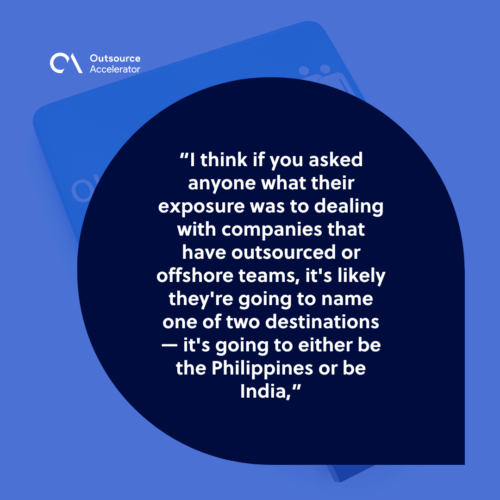Philippine outsourcing: Filipino workforce and remote work

The Philippines lies at the crossroads of eastern and western geographies — and is a land of great opportunities. The country has also evolved as a significant worldwide corporate outsourcing location.
Several companies worldwide, particularly in Australia and other wealthy countries, have been looking to outsource their processes to the Philippines.
“I think if you asked anyone what their exposure was to dealing with companies that have outsourced or offshore teams, it’s likely they’re going to name one of two destinations — it’s going to either be the Philippines or be India,” Dale Pearce noted, COO of Platinum Outsourcing.
Dale joined Derek Gallimore in the 437th episode of the Outsource Accelerator podcast. He discussed outsourcing, the Filipino workforce, the drawback of remote work, and outsourcing for Australian businesses.
If you’re wondering about the significance of Philippine outsourcing to other countries, below is a detailed explanation.

Why outsource to the Philippines?
According to Medium, the first BPO in the nation was created in 1992, and the sector has grown over the last 26 years.
“The Philippines has been around, and Filipinos have been doing [outsourcing] for two decades,” the Platinum Outsourcing COO acknowledged.
The Philippine outsourcing industry contributes nearly $30 billion annually to the economy. In 2019, it was estimated that over 1,000 BPO firms employed 1,300,000 Filipinos, and this number is increasing by 8% to 10% annually.
In addition, it is estimated that the country controls 10% to 15% of the global outsourcing market.
The Philippine outsourcing industry is so vast and diverse that you can be confident that your business demands will be satisfied because of its flexible and dedicated workforce.
Top countries that outsource to the Philippines
As mentioned, the Philippines is recognized as one of the world’s leading outsourcing destinations. The following are the top countries that outsource their services to the country:
Australia
The time difference between Australia and the Philippines is two hours, with less than five hours of travel time. That said, client and offshore teams in these two countries can work together without having to work overnight or early morning schedules.
As the local market becomes increasingly competitive, so does its complexity regarding its growing terms and functions.
Per Dale, “Although they have an understanding of outsourcing as a concept, there still seems to be the perception that it’s a complex process.”
Good thing the Philippine outsourcing industry has service providers who are knowledgeable enough to help [Australian businesses] learn the ins and outs of outsourcing.”
Further, as a business operating in Australia and offering customer service solutions, “the familiarity with [the Philippine location] is important when you are going and speaking out with potential customers.”
United States
Because the USA colonized the Philippines for nearly 50 years, many Filipinos speak English fluently and know much about American society.
This makes it easier for US companies to talk to their peers in the Philippines and ensure their efforts to outsource are successful.
The lower labor cost is another reason — the average wage in the Philippines is only $5.73 per hour, which is much less than the average pay in the US.
This means US companies can save a lot of money by sending jobs to the Philippines while still keeping high-quality standards.
India
Similar to Australia, the two and a half hours time zone difference between India and the Philippines enables businesses to provide 24-hour customer service.
For instance, a corporation in the United States that outsources work to the Philippines will likely be completed the next day and sent back to the United States for review at night. This affects the productivity and the quantity of work to be produced.
Meanwhile, the time difference between India and the Philippines enables continuous productivity.
How good is the Filipino workforce?
Notably, the Filipino workforce in the Philippine outsourcing industry has a reputation for being smart and hardworking. The Platinum Outsourcing COO acknowledged this by saying, “They’re really clever people across a variety of industries.”
Filipino resiliency and adaptability are highly valued in the global job market. Filipino workers “are [probably] just waiting for an opportunity to work for an Australian business.”
“There’s [an] enormous talent pool in the Philippines,” Dale added. And many Filipino workers can easily communicate with clients and colleagues worldwide — making them an asset to any organization that values effective communication.
Advantages and disadvantages of remote work in the Philippines
In connection to large corporations and countries outsourcing their operations to the Philippines, freelance and remote work from home has also gained popularity.
Businesses from multiple nations entrust crucial aspects of their operations to Filipinos operating from their homes.
However, there are still some advantages and disadvantages to consider.
Advantages
Flexibility is one of the most significant advantages of working remotely.
When working remotely, you can frequently choose your own hours and function from any location with internet access. This allows you to schedule your work around your life, as opposed to the other way around.
You can work at a coffee establishment or even in a different country as a digital nomad. This flexibility is especially beneficial if you have other obligations, such as family or continuing school.
Disadvantages
On the contrary, Dale find remote work a little bit on the downside. For him, “work from home is definitely role-dependent.”
“I think you just have to offer work from home as an option. You know, where the talent pool might be a little less large.” He added.
Lack of work structure can be a disadvantage too. In an in-office setup, you have a set work hours and a clear boundary between work and personal time.
The Platinum Outsourcing COO feels it is more comfortable to have their team in the office for “highly transactional roles.”

Philippine outsourcing: The mecca of global outsourcing
The Philippine outsourcing industry is a mecca for global industries due to its skilled workforce, vast talent pool, favorable business environment, and strategic location. These factors make it an attractive destination for companies looking to outsource services and save costs.
Now that you know about Philippine outsourcing, it’s time you learn more about Australian businesses and their outsourcing solutions. Do the easiest way and connect with Dale Pearce.
Visit Platinum Outsourcing’s official website and listen to episode 437 of the OA podcast here.







 Independent
Independent




